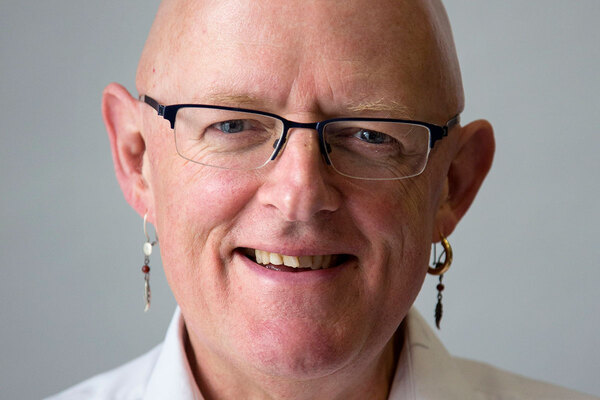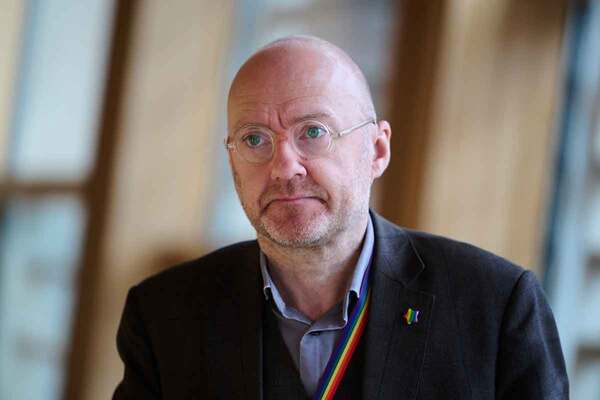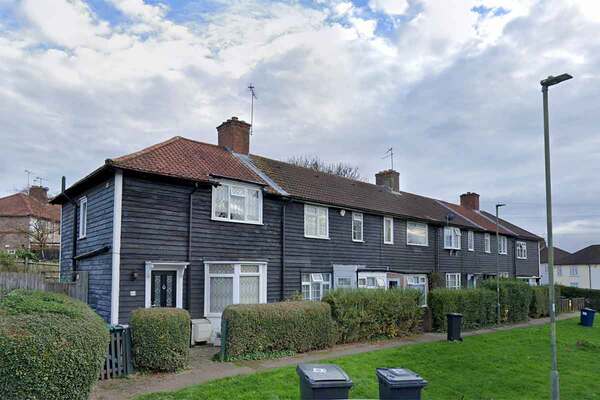You are viewing 1 of your 1 free articles
The quiet revolution
Helena Partnerships will soon join forces with neighbouring Golden Gates Housing Trust, to form a new group structure called Torus with the aim of building more homes and creating jobs. Rob Young, its chief executive elect, talks to Jess McCabe about why the deal makes sense

Source: Colin McPherson
Rob Young is not one for self-promotion. As chief executive of Helena Partnerships since the 14,000-home association broke away from St Helens council 13 years ago, 59-year-old Mr Young has played a large role in local housing politics, but has largely shunned the limelight.
Meeting Mr Young in his office, it’s immediately clear where the chief executive’s priorities lie: the office is big, modern and spacious, but plain, and the desk tucked into a corner is not bedecked with personal artifacts. An Everton FC calendar and mug are the closest things on show - Mr Young, a Liverpudlian, is a proud fan.
But an expansive balcony gives cinematic views over St Helens, the north west market town where almost all of Helena’s homes are located. In the town centre, red brick Victorian edifices sit next to 1980s blocks. From Mr Young’s office, we can see an outlet of Topps Tiles and a busy A-road. It’s not exactly glamourous, but this is a town where Helena owns one in six homes, so perhaps it’s not surprising for the view to play centre stage.
Torus: What’s in a name
If all goes to plan, in April 2015 Helena Partnerships and Golden Gates will both become part of a larger group structure. Its name? Torus.
It is named, thanks to a local marketing company, after a mathematical doughnut.
Or, as Mr Young explains, before telling me to go on YouTube to look at one: ‘Torus is like a doughnut shape that can reinvent itself, that can change its shape.’ It’s also about revolution: although Mr Young quickly clarifies this means a revolving circle, not ‘community revolution’.
However, the actual Torus brand won’t be used much: tenants in Warrington and St Helens will continue to pay their rent to and meet housing staff from Golden Gates and Helena Partnerships respectively.
Helena Partnerships’ headquarters will be head office for Torus as well, although Mr Young, Torus’ new chief executive, doesn’t want to overstate it.
‘As far as the general public’s concerned, there is no head office,’ he says.
Inside Housing has come to meet Mr Young at a time all that is going to change: and, at the same time, nothing much will change at all. Because Helena is about to join together with neighbouring housing association Golden Gates Housing Trust and become a ‘group structure’.
If the deal is approved by funders, the boards of both Helena and Golden Gates, and the Homes and Communities Agency, by April next year Mr Young will be chief executive not of Helena Partnerships, but of a new organisation called Torus.
Wielding influence
Torus will have a combined turnover of £103m and 22,000 homes but, Mr Young explains, the plan is for Helena and Golden Gates to maintain their local identities, rooted in the communities of St Helens and Warrington, the neighbouring home bases of the two stock-transfer housing associations. The aim? Save money, obviously. But the idea is also to become a bigger player that is able to wield more influence in the region.
Among the ambitions of the new group? Build 1,500 homes in the next five years (300 more than the two organisations would have built if they went it alone), create 2,500 jobs and save £25m in 10 years by reducing duplication.
‘It’s a group structure,’ Mr Young says gruffly as we sit down, after I mistakenly refer to the process as a merger. ‘There’s a proposal to merge the finances, and that’s as far as the phrase “merger” goes. It’s an important distinction.’
As Golden Gates chief executive Peter Mercer points out when we speak later on the phone, the financial merger is important. ‘We have got a small development [programme] but the structure of our loan didn’t give us a lot of flexibility to build,’ he explains. This is partly because the 8,700-home housing association only transferred out of the council in 2010; Golden Gates hopes that by joining together financially with Helena, it will be able to leverage Torus’ financial muscle, start to build and take advantage of Warrington’s economic boom - the independent urban policy research unit Centre for Cities rates it in the top 10 cities and towns for economic development in Britain, up from 54th place in 2008/09. Outside of London, Warrington has the highest number of private sector business start ups in the country.

Source: Colin McPherson
Helena and Golden Gates will continue to have their own boards, and maintain their relationships with their local councils - which, as stock transfer organisations, is embedded in their constitutions. Local tenant groups will continue to feed into the decision-making process. ‘It’s very much about keeping tried and tested identities and brands that local people have grown used to and appreciate,’ Mr Young says.
Still, the group will have just one chief executive (which, Mr Young says, sends a message about governance and the need for efficiency). Mr Mercer, who will leave Golden Gates but has not yet got firm plans for his future, is hugely complimentary of his replacement. ‘We get on very well,’ Mr Mercer says, describing Mr Young as ‘very personable, he’s got a good sense of humour. He doesn’t stand on ceremony.’
The idea for Torus was first mooted about 18 months ago, Mr Young recalls. ‘It’s really hard to pin it down. People talk, you start to develop some ideas, you start to see there’s opportunities,’ he says. ‘We sit next door to each other, we bump into each other.’
As well as being physically close, the two organisations have similar histories. Both are organisations formed from the transfer of stock away from their local councils, although Golden Gates first became an arm’s-length management organisation. Helena transferred out of the council 13 years ago. ‘There’s similar values and functions there,’ Mr Young explains. ‘And very similar challenges.’
Indeed, St Helens is only a few miles away from Warrington, the home base of Golden Gates. Helena is already building 93 homes in Warrington and is on site building another 37.

Helena Partnerships will keep its strong roots in St Helens
The group structure is also meant to avoid some duplication, and save at least £25m over 10 years. ‘Do I think we will outperform that? Yes I do,’ Mr Young says (he is prone to asking and then answering his own questions).
But the savings won’t come at the immediate cost of staff jobs, he is quick to add. ‘We’ve given assurances there will be no compulsory redundancies for at least two years,’ he says. Although some of the savings may come from ‘natural wastage’, such as older staff members retiring.
But Mr Young talks about the creation of Torus in terms of making sure that the landlords are ‘proactive about our future’ and ‘self-determining’, and ‘putting ourselves in a position to make the choices so it’s not being done to us’. This is a direct response to the welfare reforms - and particularly the bedroom tax. The policy has hit Helena Partnerships hard, as the organisation has more three-bedroom properties than there is demand for from families large enough not to be considered to be under-occupying.
Big ambitions
However, Torus has big ambitions to use its new, larger size and presumably larger influence to help residents of St Helens and Warrington to get jobs. Torus is even considering an investment in better transport links, such as a new train station planned for St Helens, to bring more money into the market town’s economy.
“He chooses what he gets involved in and shows commitment to it. The sector has a lot of respect for him.”
Geraldine Howley, chief executive of Incommunities
‘We’re hoping to be much more proactive in working with employers,’ Mr Young says. Helena has already piloted this in working with Lidl and St Helens’ chamber of commerce, finding out the skills and ‘attitudes and behaviours’ the supermarket wants from staff, then offering training to residents of its estates to prepare them for the jobs. Noteably in Warrington plans are afoot for turning a former airport base into a massive business park called Omega expected to create thousands of jobs, and Torus wants to line up its residents to fill some of them.
In terms of Mr Young’s role in heading up the new organisation, his credentials include more than 30 years in housing. The chief executive describes his family as a ‘fairly ordinary sort of people’. His father was a seaman, then worked in sales. His mother did clerical work for shipping houses in the heyday of the industry in Liverpool.
30 years and counting
1975-1979: Trainee housing manager, housing officer, Runcorn Development Corporation
January-September 1979: Assistant regional housing manager, Northern Counties Housing Association
1979-1985: District housing officer, Metropolitan Borough of Wirral
1985-1990: Assistant chief housing officer, Trafford Metropolitan Borough Council
1990-1998: Director of housing, CDS Housing, Liverpool
1998-1999: Project manager, Trenmere Housing Regeneration Project
1999-2002: Deputy director of housing and environmental protection, Metropolitan Borough of Wirral
2002-present: Chief executive of Helena Partnerships
‘I decided going to university wasn’t particularly what I wanted. I wanted to get into work and get some experience and be earning some money as well,’ he recalls. ‘There were two jobs advertised in the Liverpool Echo that sounded interesting, they sounded practical, something tangible, something that you could relate to in your everyday environment.’ One was as a trainee housing officer for New Town housing association in Runcorn, and the other was doing the same job in Warrington.
‘I’d been interviewed, offered the job and started in Runcorn before I got offered the interview at Warrington,’ he recalls, raising his eyebrows.
What followed was a varied career, working for both housing associations and local authorities across the Liverpool to Manchester corridor (see box: 30 years and counting).
Other chief executives say he is very active in groups such as the Airport group of stock transfer organisations and the Northern Housing Consortium, where he sits on the board (his CV lists eight current non-executive appointments, all in local groups working on issues such as housing, the economy and health). But publicly Mr Young’s more likely to push other staff to the front to talk about Helena’s initiatives.
‘He quietly gets along with it. He chooses what he gets involved in and shows commitment to it,’ says Geraldine Howley, chief executive of Incommunities, a stock transfer association across the Pennines from St Helens, who has worked with Mr Young in several communities over many years. ‘The sector has a lot of respect for him.’
Has he ever considered leaving the housing sector? ‘No, absolutely not,’ is Mr Young’s emphatic answer. ‘I’ve just learnt so much about myself, about other people,’ he continues. ‘There’s something for everybody in housing, there really is. It’s a real privilege to work in housing it’s a real privilege to be working in this organisation, and it’s a real absolute privilege to be chief exec. Every morning I pinch myself.’











